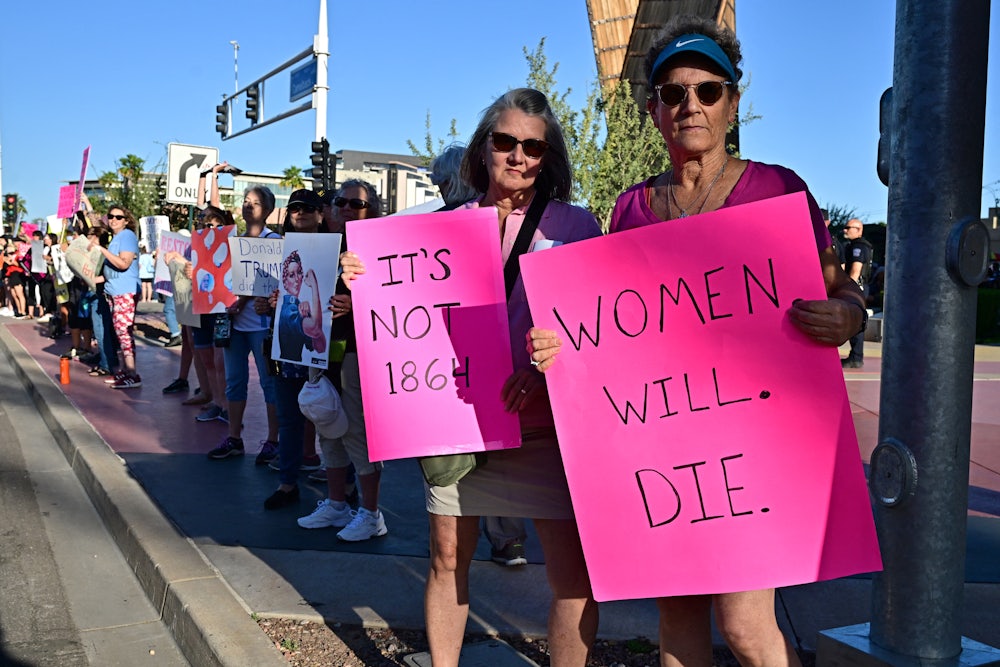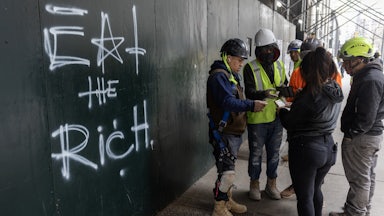Nearly two years since the Dobbs decision, it’s clear that the end of Roe didn’t end abortion; rather, it has turned the decisions we make about our intimate relationships, sex, and pregnancy into opportunities for policing and punishment. Anti-abortion activists and lawmakers claimed Dobbs wouldn’t “punish the mother” for having an abortion. But even where laws don’t expressly criminalize someone for their own abortion, that abortion is considered a crime in many states can still be used against them. Abusers have noticed and taken advantage.
New research, investigations, and analysis of helpline calls show that the legal system itself has been turned into an instrument of abuse. While this predated Dobbs, the decision led to an escalation. “Abusers have turned to our legal systems to deny their victims bodily autonomy and further harass them for, I would say, as long as our legal system has existed,” Elizabeth Ling, senior helpline counsel for the Repro Legal Helpline at the reproductive justice law project If/When/How, told me by email. “But post-Dobbs, abusers have new tools to wield against their intimate partners. They have been emboldened by actual laws and language from anti-abortion advocates and lawmakers.”
Even prior to Roe being overturned, laws meant to restrict abortion access heightened the risk of deadly intimate partner violence. Homicide remains among the leading causes of death for pregnant people and people who have recently given birth. But anti-abortion laws make the situation worse. A study published in HealthAffairs this week revealed that with “the enactment of laws intended to curtail the availability of abortion services” between the years 2014 and 2020, a 3.4 percent increase in the rate of intimate partner violence–related homicide followed.
Abusive partners can also use state anti-abortion laws to intimidate and threaten partners who had an abortion. If/When/How operates its helpline for questions and support about abortion and the law, through which it has observed the impact of anti-abortion laws and legal cases. “Before Dobbs, people did contact the Helpline because they feared an abusive partner could use their abortion or knowledge of a pregnancy against them,” said Ling. But since, calls have increased, and with survivors “weighing the risks of their abusive relationship against their access to abortion.” Along with the helpline getting more calls, Ling said, “we have seen the threats from abusers become more specific. Some have threatened to call the police on family members who help them access abortion. Other abusers have falsely claimed it is a crime to leave the state, or [that] their victim has to have their consent to get an abortion. And abusers are weaponizing the rising abortion stigma against their victims, suggesting that their decision to get an abortion will harm them in unrelated court proceedings.”
Abusers don’t simply turn to the law as a threat; they are also able to extend their abuse through the criminal legal system and the family policing system themselves. “Survivors are being forced to walk the line of isolation and safety to get the abortion they need, while minimizing their risks of criminalization and punishment by their abuser—and the state,” said Ling. “And this fear isn’t unfounded.” We see it in cases such as those assisted by anti-abortion lawyers like Jonathan Mitchell, who has helped at least two men in Texas bring legal action claiming their (now former) partners had abortions without their consent, characterizing the abortion as a “wrongful death.”
In one case, first reported by the Texas Tribune, the ex-partner filed screenshots from his former wife’s group chat to support his claim that her friends conspired to assist her in getting an abortion. The case may fail, but it has already helped the ex-partner to further intimidate his former wife. She knew that even before he began. In one message filed with the ex’s complaint, she stated directly, “I know either way he will use it against me.… If I told him before, which I’m not, he would use it as [a way to] try to stay with me. And after the fact, I know he will try to act like he has some right to the decision.” Her friends have filed a countersuit against the ex, in which they claim that he had access to their group chat before he said his ex-wife had an abortion. “He wasn’t interested in stopping her from terminating a possible pregnancy,” their complaint states. “Instead, he wanted to obtain evidence he could use against her if she refused to stay under his control, which is precisely what he tried to do.” This man apparently saw an opportunity to continue to punish his former wife, even after she had left him, through the use of the law.
“State collusion with abusers has meant that survivors of intimate partner violence have faced criminal investigations, subpoenas for survivors’ private health information, family regulation system interventions, and even prosecution and convictions for self-managing an abortion or experiencing a pregnancy loss,” said Ling. Anti-abortion laws such as Texas’s Senate Bill 8 allow abusers to use the legal system to isolate their former partners from the support they need. “It’s a disgusting gift by the state to abusers,” Ling said.








